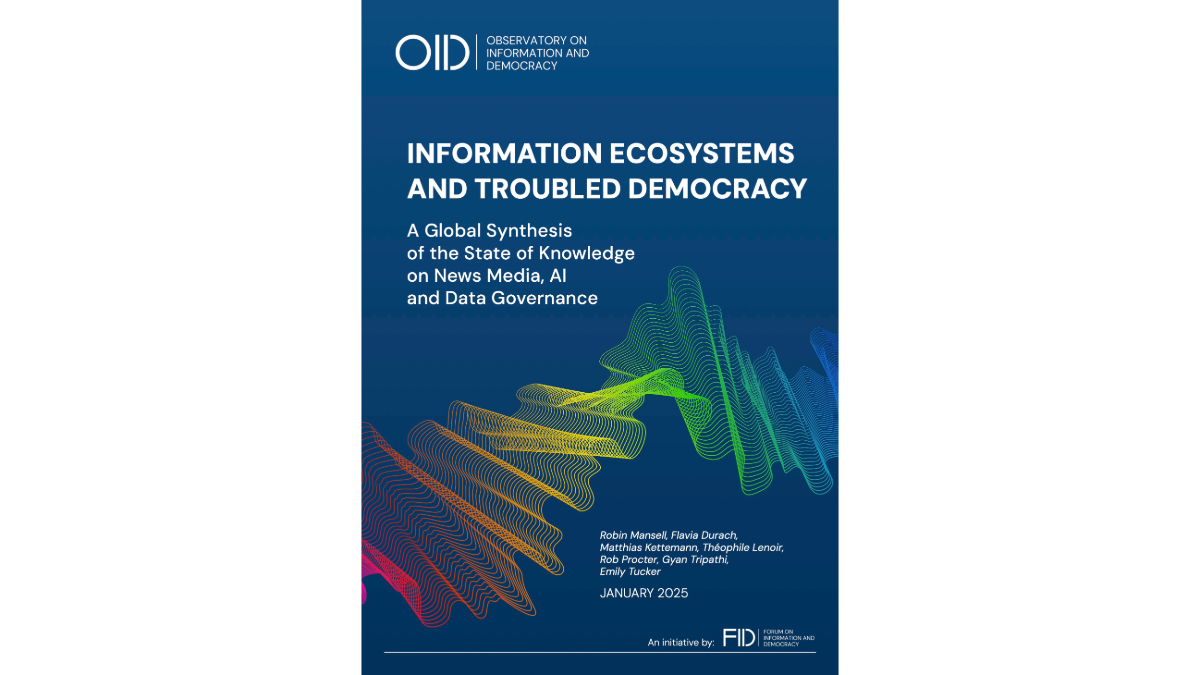Beyond Moderation: Challenging Big Tech’s Power in a Troubled Time for Democracy
Iris Boyer, Robin Mansell / Jan 15, 2025Iris Boyer is head and Robin Mansell is scientific director of the International Observatory on Information and Democracy, hosted by the Forum on Information and Democracy, which today released its report titled Information Ecosystems and Troubled Democracy.

Composite. Meta founder and CEO Mark Zuckerberg, left. X owner Elon Musk, right.
Policy debate around online content moderation is taking on a new urgency. From Elon Musk’s restructuring of X (formerly Twitter) to fit his own political agenda to Meta founder Mark Zuckerberg’s announcement this month that his company would shutter fact-checking and loosen policies on hate speech, these sudden u-turns at the whim of billionaire CEOs expose the troubling power asymmetries facing online users and policymakers when they grapple with the Big Tech firms that govern the flow of information across social media platforms.
Big Tech’s self-legitimizing, economically and politically-motivated changes are alarming. They are happening at a time of great geopolitical instability when domestic and foreign actors are weaponizing Information, exploitative data practices are becoming normalized, and AI tools are outpacing ethical and regulatory safeguards. This moment demands a close look at how major tech companies wield control over the information space, a theme at the center of the report Information Ecosystems and Troubled Democracy by the International Observatory on Information & Democracy, released today.
Echoing the ethos of International Panel on Climate Change (IPCC) reports on climate change, which seek to collect the sum of human knowledge on that subject to give policymakers the best information with which to make decisions, Information Ecosystems and Troubled Democracy provides a roadmap for inclusive, rights-respecting information ecosystems. It calls for open and decolonized research and action by policymakers, tech companies, and civil society organizations. The report points to a future where the Global Majority World and the Global North collaboratively shape equitable, just, and sustainable information ecosystems.
Based on a critical review of research referencing over 1,600 sources from the Global North and the Global Majority World, the report collects what we know and don’t know about the causes and consequences of recent transformations in information ecosystems. Amidst technology boosterism, huge concern about online deception, the rise of populism and political polarization, and significant gaps between the rich and the disadvantaged, the report explains why measures to curtail mis- and disinformation generate intense controversy and what needs to be done to support a more democratic and healthy information environment.
Putting recent events in perspective
The assessment of the literature conducted for this report also helps put recent events in perspective. Both Elon Musk and Mark Zuckerberg claim that dismantling certain content moderation systems and policies in favor of alternatives such as "Community Notes" will empower users. But these claims lack accountability and enable harmful content to thrive, prioritizing engagement—and profit—over information integrity. This distorts the information space. Zuckerberg’s Meta intends to change its algorithms so that they catch less ‘bad’ content. These moves ignore a key Observatory finding: simply tweaking algorithms will not address deepening structural inequities when Big Tech promotes online engagement for data monetization.
It is extraordinary that the world’s largest social media company has turned its back on global accountability by reversing decade-long global efforts to safeguard information integrity and imposing an American supremacist vision of freedom of speech while smearing digital policy leaders like the EU and Brazil. When figures like Zuckerberg call fact-checkers politically biased, discourage independent research, and tap into the far-right playbook, it’s clear that a full assessment of the evidence on the implications of Big Tech’s power over information and democracy is urgently needed and that policymakers must redouble their efforts to address these issues.

The cover of the report, Information Ecosystems and Troubled Democracy, released today.
For instance, one rational response to platforms abandoning fact-checking is for policymakers to consider how to compensate, including finding rights-respecting ways to reduce mis- and disinformation in the ecosystem and ways to promote quality news and journalism. The body of research analyzed in the report demonstrates that monopolistic digital platform business strategies threaten the viability of news production and impact healthy news consumption. With the news media industry in crisis in many countries, this power asymmetry must be addressed by strengthening the bargaining power of news organizations, especially smaller news organizations. Both liberal democratic and autocratic countries need to be investigated. It is essential to support research on the effects of different media ownership and market structures on the viability of the news media industry, to foster investment in public service media, and to protect journalists who seek to report accurate news.
Framing key questions going forward
Stepping back from the full body of research considered in this review, the report points to an overemphasis on certain topics, such as the impacts of mis/disinformation on individual participation in online echo chambers and political polarization. It calls for more research on systemic factors that allow Big Tech to flourish unchecked. Why are these companies permitted to wield disproportionate power? How can accountability be strengthened? How can online communities control their data to achieve data justice? Content moderation – even done independently – is not a silver bullet answer to disinformation and hate speech. Investment in media, information, and AI literacy training is essential, but so are grassroots resistance strategies, including innovative municipal efforts to wrest control of data from Big Tech. The current Big Tech designs of information ecosystems are not inevitable—different choices are possible, and alternatives are being built.
The stakes could not be higher. The tech tycoons' US-centric strategies threaten to determine online experience, not just in the US but globally, and the very fabric of our democracies. Public policy and civil society action are urgently needed to challenge Big Tech's dominance and rebuild public trust. This means confronting power distortions at the heart of today’s information crisis and demanding respect for human rights - both the rights of online speakers and the rights of others.
Authors

